This page contains affiliate links. We may earn money or products from the companies mentioned in this post through our independently chosen links, which earn us a commission. Learn More
The Alaskan Malamute is a domestic dog breed that originated from Alaska and mostly known to be one of the oldest sled dogs. It’s a large dog at about 22 to 26 inches tall, weighing between 71 to 95 pounds. The lifespan of the Alaskan Malamute is around 10 to 12 years.
Owning an Alaskan Malamute should not be taken lightly, as she is a high maintenance dog in many respects and needs a dedicated owner who understands this. In fact, there are many Malamutes in rescue centers due to people buying them without having a good understanding of the breed.
Contents & Quick Navigation
Keep reading to find out more about what owning an Alaskan Malamute involves.
1. She loves to have a job while exercising
The Alaskan Malamute is a working dog through and through, bred for stamina and strength. Like the Siberian Husky and Alaskan Husky, she was bred to pull sleds over long distances.
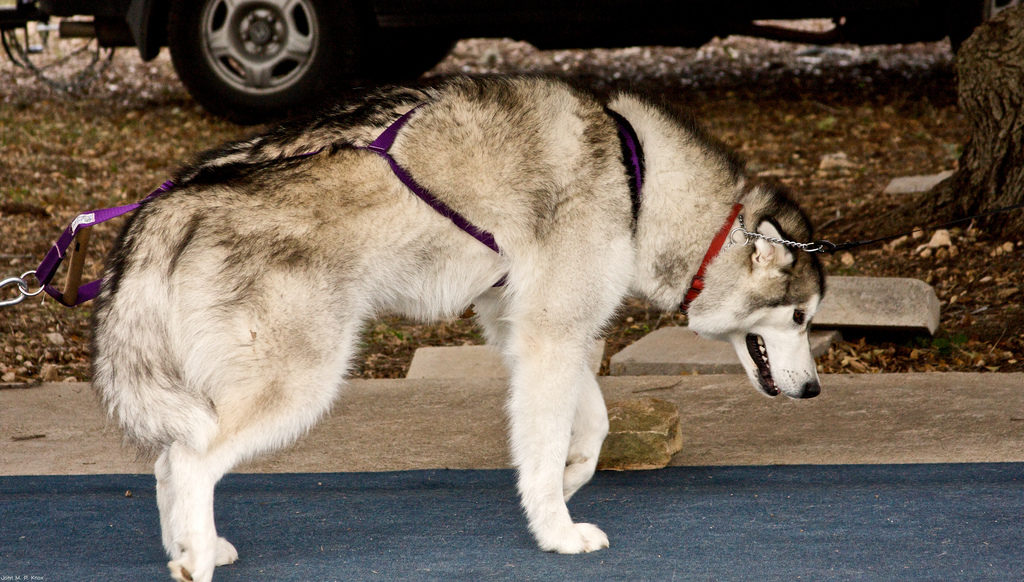
The key difference with the Malamute is that, while the Huskies are known for their speed, she is much larger and stronger. Alaskan Malamute can pull extremely heavy loads of up to 3,300 lb (1500 kg).
Given her working background, she needs lots of exercise (1 ½ – 2 hours a day). Not only that, but she also thrives on having a job to do while exercising.
Here are a few of the activities she excels at:
- Hiking (while carrying a doggie backpack)
- Bikejoring (pulling someone on a bike)
- Skatejoring (pulling someone on skates)
- Skijoring (pulling someone on skis)
- Carting (pulling a cart)
- Sledding (pulling a sled)
- Agility classes
Check out how focused this group of backpacking Malamutes are:
Since this is a large breed who needs to be active and loves being outdoors, I don’t suggest you get a Malamute if you live in an apartment. She needs space to roam and a garden to play and run in. In a small space, she is likely to become frustrated, which can lead to noise (howling) and destruction (chewed furniture).
2. She needs a firm leader
Like the Siberian Husky, the Alaskan Malamute needs a firm leader and isn’t the ideal dog of choice for a first-time owner, unless you’re really willing to put the work in.
Similar to the Siberian Husky, her obstinacy can be confused with not having much upstairs, but she is, in fact, an intelligent dog. If she senses you are not a strong leader, she is unlikely to obey, and will happily do whatever she feels like doing.
With the right training and consistent, strong leadership, she can learn to be a follower. I advise you start obedience training with her from a young age so that you can learn how to manage your (rather willful) Malamute.
Further Reading
3. She likes spending time with her family
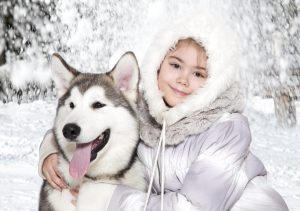 The Alaskan Malamute has a strong pack instinct and, therefore, wants to be included as a part of the family and loves to be around you. She does not like being left alone for extended periods of time (no more than 3 or 4 hours).
The Alaskan Malamute has a strong pack instinct and, therefore, wants to be included as a part of the family and loves to be around you. She does not like being left alone for extended periods of time (no more than 3 or 4 hours).
She is a gentle soul, underneath all that muscle and fur! According to the AKC, she ‘loves children.’ Indeed, I find she is usually patient and affectionate with kids. She is better off with slightly older children, however, as she is a large dog who grows fast; an energetic Malamute puppy could knock over a small child without meaning to.
As with all large dog breeds, you should always supervise interaction between your Malamute and your child.
4. She doesn’t tolerate hot climates
Like the Huskies, the Malamute is highly sensitive to heat. If you live somewhere where the temperature goes above 80 degrees (26.6°C), I don’t advise getting a Malamute.
In summer months, provide her with shade and plenty of water to keep her cool, and avoid exercising her during the hottest hours of the day.
The Malamute can certainly withstand living outdoors in cold climates due to her dense double coat, but she still needs adequate shelter.
5. She sheds heavily twice a year
The Alaskan Malamute has an extremely thick double coat, consisting of a coarse outer and an undercoat about 1-2 inches deep, which is oily and wooly.
Like Siberian Huskies, these dogs shed their entire undercoat twice a year (in spring and fall), which means for about 3 weeks you’ll be finding large clumps of fur around the house. During this time, brush daily with a heavy-duty comb that reaches into the undercoat, and, well… do I have to mention the vacuum cleaner?
This video gives you an excellent idea of how much fur a Malamute loses during shedding season, and how much effort is required when grooming her:
Apart from these heavy shedding periods, she sheds a low to moderate amount and will need brushing just once or twice a week to remove dead fur.
6. She has a high prey drive
Alaskan Malamutes were not only used for sled pulling, but also to hunt seals, and even polar bears.
Due to this hunting background, Alaskan Malamutes tend to have a high prey drive and are likely to chase small animals like squirrels and rabbits, as well as cats. So, if you are in an area where she might chase, and there is a road nearby, you should always keep her on the leash.
Alaskan Malamutes can usually get on with pet cats if she is raised from a young age with them. This way, she will consider the cat as part of her pack.
7. She likes to dig!
Malamutes are quite the professional diggers and can make a real mess in the garden when they put their mind to it. If you’ve got a lovingly landscaped outdoor space with pristine flowerbeds, it might be an idea to make a sandbox or another area that is all hers to carry out all her digging desires. Nice compromise, don’t you think?
Now, let’s talk about the garden fence. While Huskies are more likely to jump over it, the Malamute – that´s right – can tunnel her way under there in no time if not properly entertained and exercised. This shouldn’t be a problem if you see to it that all her needs are met.
Conclusion
So do you think you´ve got what it takes to own this gentle giant? Let’s recap what we’ve learned about her.
She:
- Needs plenty of exercise (and a job while she’s at it)
- Does better living in a house with a garden
- Needs a firm leader
- Makes a great family dog
- Doesn’t do well in the heat
- Sheds heavily twice a year
- Has a high prey drive
- Is a professional digger
Can you give an Alaskan Malamute a forever home? Comment below!

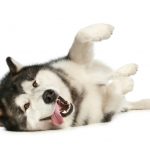
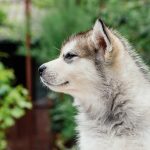

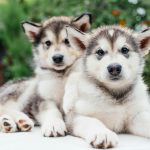

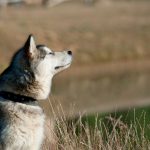
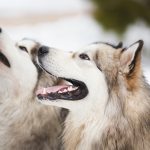

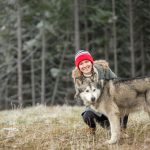
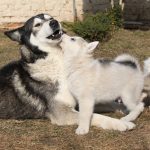
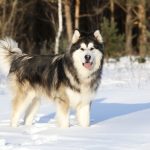

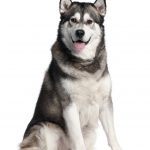
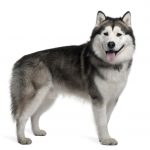
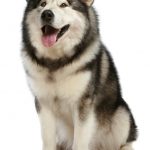
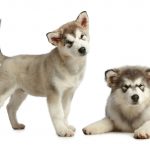
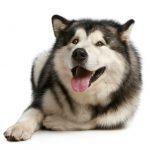
18 replies on “7 Things To Know Before Getting An Alaskan Malamute”
I live in Indiana and I am wanting a husky of a malamute which breed would be a better fit for Indiana weather. do malamutes have a lot of problems health wise?
Have you considered a mix of a husky and malamute with other breeds? I personally have a Pitsky (Pitbull (Am. Stafford) X Husky) and she has shorter hair and also therefor less problems with a lighter temperatures. She still does have a lot of the characteristics of a husky and combined with the lovely characteristics of the Am. Stafford.
Unfortunately I can not tell you whether a husky or a malamute would be best for the weather over there, but look into what I just mentioned. There are also a lot of other mixes with husky’s or malamutes which are also very lovely and make great companions!
I would recommend more of a husky in that kind of weather rather than a malamute. right now my Malamute about 9 weeks old and even in the house she complains when it’s basically over 75- 80 degrees and is constantly wanting to go outside where it’s like 20 degrees ( anchorage, alaska) not saying it’s undoable to have a malamute down there but in the summer you’re going to want it like some wet Frozen towels so they can chew on them and give him a lot of cool water, shade. also try to freeze a wet towel and laid on the ground so they can lay on it. and in the winter be prepared to be outside for an hour or two I’ve even had my Malamute trick me that she had to go potty just so she can go play in the snow
Hi, I think ether would be fine that far north, depending on your property. (I prob wouldn’t recommend for apartment, town home living. I grew up with both in Georgia. (One was malamute with Akita timbershepard in him, & the other was husky with supposedly a little wolf also.. We rescued both.) They were mostly inside dogs for us, who enjoyed the central air conditioning just as much as playing outside & escaping to run. We tried an actual run, but the malamute was attacked by two pit bulls while on it, & was unable to defend himself because of it. Both dogs were very fast, I’d recommend letting them exercise so they don’t take off on you. I would say the malamute was faster & it would take a car to catch up to him miles away. Everything in this article is spot on! Both shed quite a bit, but the malamute was more. I’m talking several grocery bags full!!! we joke, 20yrs later we still find hair. As soon as it begins to shed, brush & brush & brush, summers will be more tolerable the sooner you get it off of them. They didn’t stink as much as other hot dogs, but they consume a lot of water & food! On vacation in Florida once the malamute ran broke the fence burrowed under trees in the a neighbors yard to cool off. They were both were able to predict the snow, but the malamute might have been a little better at it. They stick their noses in the air & start to sniff looking at the clouds. Our biggest health issues were prob with the malamute. Both got cancer in the end, but the malamute took separation harder. Undergarments eaten, socks had to be surgically removed once, doors & carpets clawed at if large amounts of company came & we needed them away from the crowd. Had we had him from a puppy, & he was use to it, this may have been different ♀️. They each liked to curl up in dark corners behind furniture in our living room. I wonder if we couldnt have also created that atmosphere as a puppy for them somewhere else in the house more removed for when lots of company came. The malamute also had heart worms from before we got him, overall he healed really well & very fast, perhaps bc of the Wolf. He lived to be 17, but his hips went first. His weight is 130-180lbs at times, & taller than I was on his back legs. (Neuder, if young/small/petite females around.) The Husky’s lifespan is longer than most, but not as long as the malamute, his hips were also bad, but he was no where near as big so because of the difference in the weight they didn’t seem as bad as the malamutes. The malamute was Super protective! A firm low commanding voice is a must. If we told him it was ok, he was fine. However, if we were away, the neighbor who he loved in our company couldn’t come over or near him to even feed him for us! At a kennel he was fine, although that’s where he learned to bark instead of just howl. We loved both, but I think the malamute was all of our favorite, but arguably more work. maybe it was just that we learned on him, so we had the voice down pat by the time we introduced the husky. Our husky looked scarier, but neither were aggressive dogs, unless someone unknown approached us/ the house & then they both took ques from our behavior. (That being said, don’t leave them on the front porch for the poor ups guy…. Our packages were always left in the middle of the yard.)
Thank you for writing this! Malamutes are wonderful dogs, but they are not for the faint of heart or novice owner. Excellent post!
we have a malamute he will be 11 yrs old in Feb 2018. have had him from 8 wks old. My husband is a retired school teacher, treated our Malamute like his students – firm hand, established “alpha” male within days. yes, our Koko ran (far & wide) as a young dog, we always got him back, but after neutering, took about a year for the “wanderlust” to abate. He has 10 acres to run around in, he is never on leash. He is older now, stays close to home, has his outside house, his food/water is given to him outside, but always water for him in the house. He is kind, gentle, loves people, children, protective of elderly people (will sit very close to them), hates cats & small rodents, will often see him “mousing” in winter or digging into the snow looking for his bones (he loves bones). He stays close to home now as he’s older, does not go far (some arthritis now), Personally, I never had a dog before in my life, this was my 1st, I would not have any other. He is a beautiful dog, loyal “to the nines”, totally awesome dog. I am alpha 2. when alpha 1 is away, he stays close to me – he knows when I am alone. He knows word & hand signals. We never took koko to “training or obedience” school. Our BASIC rule-treat your dog as if they were your child – Consistent SIMPLE/SINGLE words because that is what they understand – yes, no, stay, here, come, good boy/girl, finger snap, hand clap, etc. They are EASILY trained if you are consistent.
Great information. Even apart from shedding their entire coat twice a year, Alaskan Malamutes still shed year round also so you’ll have to brush a couple times a week to keep it under control. I use the paws pamper undercoat rake which works really well at removing all the loose dead undercoat so it doesn’t end up all over your house and clothes (it’ll still happen just not as much!).
I work 12 hour shifts days and nights and we are considering getting a Malamute, how do they do with alone time? Do they chew when they are bored? And if provided with enough toys and exercise would my schedule be a problem for this breed of dog?
I had husky malamute growing up, it was the best dog ever. He loved kids very protective of children and the family. Loved to run, play ball, dig holes to stay cool. Shedding time he needed to have a lot of brushing a few times a week for about a month. Needed a lot of water but did not like to get wet. He was a little food aggressive but warned you by pushing us away when he was eating. The neighborhood loved him too,when they heard him bark there was something going on that needed attention. There was a number of others that had gotting one also because of what they had seen with ours versus what they had heard. No one had ever regretted have one. People that have had them normally gotten another. Once I get a house with some land I will get two or more. They are great.
We are a retired couple who have had a dog in our home most of our 38 years of married life. Most of our dogs have been mixed breed and 65-70 lbs. Our last dog died a little over a year ago and we are ready to welcome a new addition into our home. As retirees we are home a lot and can give lots of attention to our pet. We have always gotten our dogs from shelters. We have a yard enclosed by a 6 foot privacy fence so this malamute we are considering would have room to roam about. We are not big on this breeds digging tendency, but other that this breed group seems to be a good fit with us. Are there other major concerns we need to be mindful of before getting serious about this dog?
One other thing about Malamutes. When they fight with other dogs, they don’t fight face to face but rather take out the legs, knocking the other dog to the ground so the can get on top. They do NOT do well with large aggressive breeds because they won’t back down and can do a great deal of harm, more than most breeds, if provoked.
I work at a doggie daycare and we have a few Alaskan Malamutes there I love each other and everyday I spend with them makes me want one more and more
I have a husky/ malamute mix. He is around the size of the malamute with the huskys blue Hugh’s and of the black, grey, white markings. He loves to excape but rather than run like the husky stays closer to home. He is not as energetic as the husky which is great. He is very territorial towards other make dogs tho.
I have a Golden Lab and Malamute mix. Grandpa was a Husky. This is a great constellation. I just love that dog. And it is right, this kind of dog is very strong and needs quiet a bit of care. The article above exactly describes the character of my dog. He can be very lovely and needs your attention but watch out when he is sleepy, no way to touch him then.
I had a beautiful Malamute. He was a wonderful dog. He never did any digging as I can recall. He was great with my kids and all the neighborhood kids. He hated to go to the vet…impossible. Other then going to the vet he was really easy to take care of and loved our family.
He was protective of the family too.
I have a male Alaskan Malamute/Siberian Husky mix. Loves his play not aggressive at. All he has a little brother her who is all terrier and the fight and play like big dog. Although they are high maintenance and ornery
Thank you for your information about Alaskan malamutes. Now I am ready to have this dog of my dreams.
I have two Wonderful malamutes , I had two others they are wonderful empathetic animals with people. Some like my male are quite strong alphas and can pull 3000lbs. We are aware he will take another male down if they chin him, if you monitor their fiends closely you will have one of the most loyal, clowns, that love you !